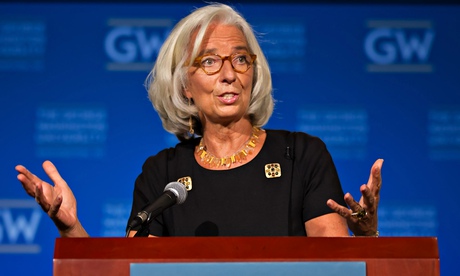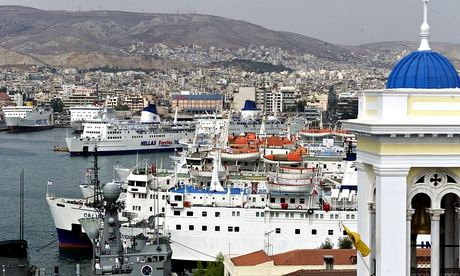Alex Andreou theguardian.com, Tuesday 25 February 2014
The IMF chief's admission that the wrong solutions were applied to the crisis seems crass, given what Greeks are suffering
Christine Lagarde claimed that the IMF, the EC and the ECB had ‘made sure there was enough of a safety net so that people who were most exposed would not suffer too much'. Photograph: Handout/Getty
Christine Lagarde made some comments in an interview for Australia's ABC which have passed largely unreported, Greece no longer being the crisis en vogue. She admitted that the troika – the entity consisting of the European commission, the European Central Bank and the International Monetary Fund, of which Lagarde is the head – was mistaken in its calculations initially and that this led to the wrong economic solutions being applied to the Greek crisis. She claimed, nevertheless, that they had "made sure there was enough of a safety net so that people who were most exposed would not suffer too much".
I don't know what Lagarde sees when she visits Greece. Perhaps it is a different country to the one I experience whenever I travel back. After all, for someone on a cool, tax-free $500,000 salary, who no doubt flies first class and is transferred by limousine between five-star hotels and clean, white marble conference buildings, reality may be easy to miss.
Or perhaps there is another, first-class reality, a five-star version of events. Such a visitor is unlikely to see the old women clad in black dresses and scarves, who appear like an ancient Greek chorus as soon as supermarkets have rolled down their shutters, in order to search through the bins for scraps in the evening gloom. Or the thousands queueing up every day for care packages from Médecins du Monde, or the addicts shooting up in the streets, or the body bags of families being wheeled out of flats, suffocated as they burned rubbish in their stove to keep warm. In my own small town of Mykonos – largely insulated by virtue of its popularity as a holiday destination – two people tried to kill themselves last week, due to financial ruin.
On Friday the respected medical journal the Lancet published a report which told quite a different story to that offered by the head of the IMF. It set out the devastating effect austerity has had on the health of the nation. It explained how the drastic reduction in healthcare and social spending combined with the pressure of a higher tax burden, unemployment of nearly 25% and an economy which has shrunk more than 20% in the last few years to create a pincer movement which has caught millions of innocent people in its grip.
It has resulted in 800,000 people with no health coverage, escalations in HIV infection, suicide rates, infant mortality, child abandonment, deaths related to violence and ill health from poor nutrition. All the data were corroborated, and have even deteriorated since being collated for the report.
"In view of this detailed body of evidence for the harmful effects of austerity on health, the failure of public recognition of the issue by successive Greek governments and international agencies is remarkable. Indeed, the predominant response has been denial that any serious difficulties exist", the Lancet report concludes. "This dismissal meets the criteria for denialism, which refuses to acknowledge, and indeed attempts to discredit, scientific research."
It is the essence of such denialism which Lagarde exhibits when she says Greece is out of the woods and praises the country for reportedly achieving a primary surplus of more than €1.5bn – a giant amount for such a small economy. This surplus is in itself the subject of very lively debate, with many suggesting it is the result of the same creative accounting techniques that got the country's economy into trouble to begin with.
This denial is accompanied by a monumental crassness; a lack of even the most rudimentary understanding of Greece's collective psyche, its people and its history. How else can one explain Lagarde saying that "we can only celebrate now the fact Greece is finally coming out with a primary surplus, as we call it, which hasn't happened since 1943"?
In 1943 Greece was in the middle of a four-year occupation by Nazi Germany, a period during which the country mourned nearly 10% of its population; the victims of violence, execution, disease and hunger. The Great Famine of Athens alone resulted in an estimated 300,000 deaths in the winter of 1942. It's good to know, however, that the country's books were balanced.
Are such comments the result of gargantuan thoughtlessness – or do they hide a deeper, uglier message, that Greece does best under foreign rule? One thing is certain: that tragically they play directly into the hands of fascist organisations like Golden Dawn, with its not-really-a-swastika logo, not-really-nazi salute and not-really-criminal parliamentarians. Their central message is one of suffering Hellenism under an economic occupation. Their central promise, to rid Greece of foreign interference. Recent opinion polls have them comfortably in third position. Every time Christine Lagarde decides to comment on Greece, they must cheer.
![The [Greek] European Tragedy](https://blogger.googleusercontent.com/img/b/R29vZ2xl/AVvXsEiWKI5s90SFm1wWTk6bs4p7CgslaC2SnYPsrZhb-B-smOufNNCSxCvpBLI9hOB-LsXZjir_PNmEiMk2-E62F3xkg96IoC6QFAaZAnPRTVH340IN9WBRmWJqPkjWlgyRj3zpALp7h6hvA58/s920/GkBack_new.jpg)


